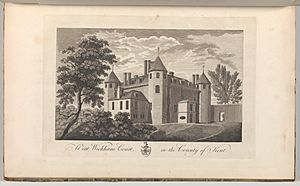Sir Stephen Lennard, 2nd Baronet facts for kids
Sir Stephen Lennard, 2nd Baronet (born March 2, 1637 – died December 15, 1709) was an important English landowner and politician. He lived at Wickham Court in West Wickham, Kent. He was a member of the House of Commons of England and later the House of Commons of Great Britain. This means he helped make laws for the country.
Early Life and Family
Stephen Lennard was the son of Sir Stephen Lennard, 1st Baronet. His mother was Anne Oglander. She came from a family on the Isle of Wight. On December 30, 1671, Stephen married Elizabeth Roy. She was a widow from Dorset.
In 1679, he became a deputy lieutenant for Kent. This was an important local role. On January 29, 1680, his father passed away. Stephen then became the 2nd Baronet. A baronet is a special title, like a knight, that can be passed down in a family. After this, he also became a Justice of the Peace (JP). This meant he helped keep law and order in his area.
A Career in Parliament
Stephen Lennard first became a Member of Parliament (MP) in 1681. He was elected for a place called Winchelsea. An MP is someone elected to represent people in Parliament. He didn't take a very active part in Parliament at first. By 1683, he was a colonel in the local army, called the militia.
In 1688, he lost his local jobs. This happened because he didn't agree with some new rules from the King. But later that year, he got his jobs back. He became a Justice of the Peace and a Colonel again. He also continued to be a deputy lieutenant for the rest of his life.
Representing Kent
In 1698, Stephen Lennard was elected as an MP again. This time, he represented the county of Kent. He was chosen without anyone running against him. He did not stand for election in 1701.
He was elected for Kent again in 1708. He was part of a political group called the Whigs. In 1709, he supported a law to help people from other countries become British citizens. He also joined a group working on a local road project.
Final Days
On December 14, 1709, Parliament voted to put a religious leader, Dr. Sacheverell, on trial. Stephen Lennard made a comment about it, saying they were going "to roast a parson."
The very next day, December 15, 1709, Stephen Lennard suddenly passed away. He was 72 years old. He was walking in London when it happened. He was buried in West Wickham. He had three daughters and a son named Samuel. Samuel then became the 3rd Baronet.
 | Kyle Baker |
 | Joseph Yoakum |
 | Laura Wheeler Waring |
 | Henry Ossawa Tanner |


